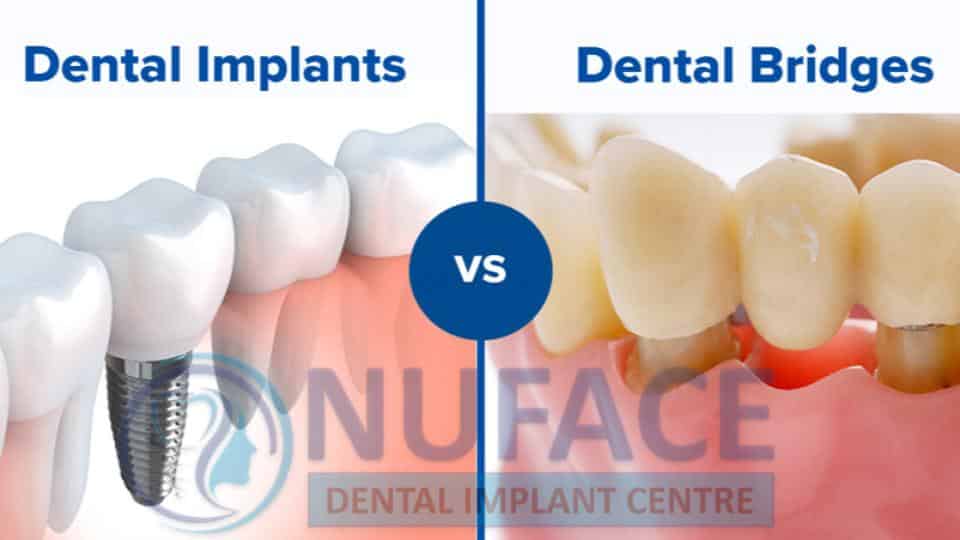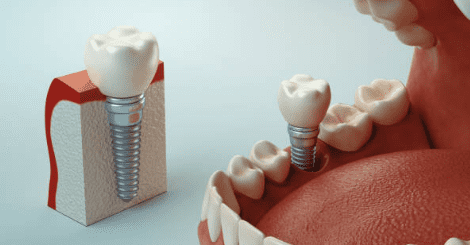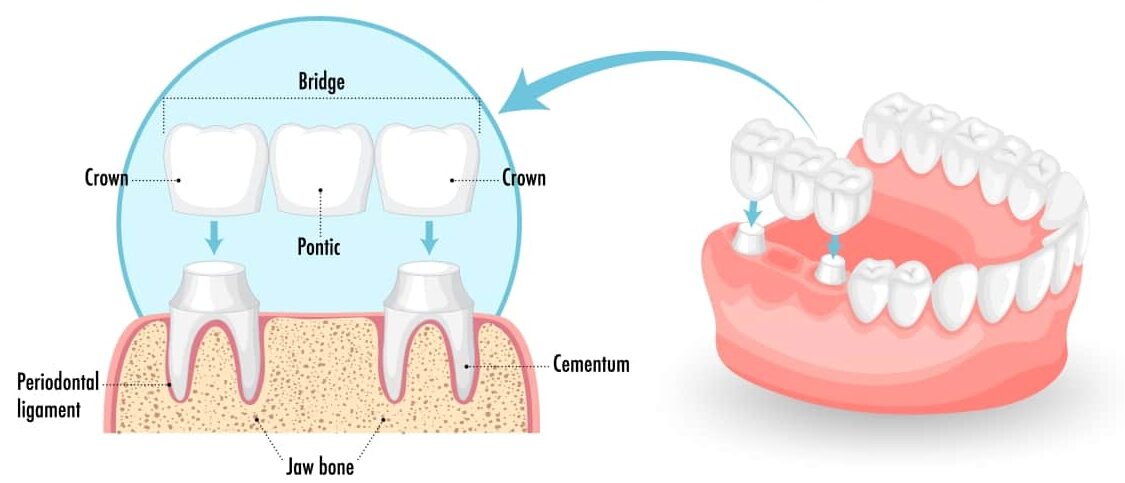
When it comes to replacing missing teeth, two popular options are dental implants and dental bridges. Both solutions aim to restore functionality and improve your appearance and speech, but they have distinct differences.
When you lose a tooth or tooth extracted, the top priority is to get your smile back to its full functionality. Having gaps in your teeth can seriously impact your self-esteem and confidence because it affects your appearance and speech. That’s where dental implants and dental bridges come into play as two common solutions to tackle these issues.
Although dental implants and bridges may seem similar in some ways, they actually work quite differently from a technical standpoint. So, if you’re trying to figure out which solution is best for your missing teeth, it’s crucial to get a deeper understanding of both options. Talking to your dentist will help you make the right decision and get that perfect smile back!

The structure of a tooth is more intricate than many people realize. When a tooth is lost, not only the visible part is affected, but also the underlying support system consisting of bone, ligaments, and nerves.
To address this issue, dentists use dental implants. A dental implant is like a metal post, usually made of titanium, that takes the place of the missing tooth’s root. It is carefully inserted into the jawbone during a minor surgery. Over the course of a few months, the implanted metal fuses with the surrounding bone, creating a strong foundation.
Once the implant has fully integrated with the bone and is deemed stable by your dentist, a crown is placed on top of it. The crown is custom-made to match your natural teeth and is securely attached to the implant. This completes the restoration, giving you a functional and attractive replacement tooth that will serve you well for a long time!
Read Also: Fixing Loose Dental Implants

If you have a missing tooth and there are healthy teeth on both sides of the gap, your dentist might recommend a dental bridge as a solution. A dental bridge is a restorative option that involves placing a false tooth between two crowns. These crowns are then securely attached to the healthy teeth adjacent to the gap. The false tooth, usually made of porcelain, is carefully designed to match the color of your natural teeth.
In simple terms, a dental bridge acts as a “bridge” that fills in the space created by the missing tooth. It not only restores your smile but also helps maintain the alignment and function of your teeth. If your missing tooth is located towards the back of your mouth, a dental bridge could be the best choice for you. Your dentist will be able to guide you on whether a dental bridge is the most suitable option based on your individual needs and oral health.
Dental implants and bridges are both options for replacing missing teeth, and they can both provide natural-looking results. However, they each have their own advantages and disadvantages. Let’s take a closer look at how these two tooth replacement options compare:
– Dental bridges are often covered by insurance plans, which can help with the cost.
– They don’t usually require bone grafting or extensive surgery, making the procedure less invasive.
– Dental bridges typically have a lower upfront cost compared to dental implants, making them a more budget-friendly option.
– The process of getting a dental bridge usually involves only two visits to your dentist, spaced over a couple of weeks.
– Dental bridges have a lifespan of about 5 to 7 years and may need replacement during that time. However, with proper care, they can last more than 10 years.
– As dental bridges age, their appearance may become less natural-looking.
– The neighboring teeth supporting the bridge may be more susceptible to cavities and tooth decay compared to dental implants.
– There’s a risk of potential damage to the healthy teeth adjacent to the missing tooth due to the support required for the bridge.
– Dental implants have an impressive lifespan, often lasting 15 years or more, making them the longest-lasting tooth replacement option available.
– They retain a natural-looking appearance for a longer time compared to dental bridges.
– Dental implants don’t cause harm to the healthy teeth surrounding them, as they act independently.
– They boast a very high success rate, with around 97 percent success over a 10-year period.
– Dental implants may be less likely to be covered by insurance plans, leading to potential higher out-of-pocket costs for the procedure.
– The process of getting dental implants can take longer, usually up to 6 months, as it involves the integration of the implant with the jawbone.
– The upfront cost of dental implants is typically higher compared to dental bridges.
– There is a possibility of surgical complications during the implantation process.
Read also: What to know before getting Dental Implants
When patients have lost several teeth in a row, dentists often suggest a mixed approach to address the situation effectively.
For instance, if you have lost all your molars, your dentist may recommend placing a dental implant at one end of the gap where there is no longer a tooth. On the other end, your dentist might attach a cap, creating a bridge that connects the implant post to the healthy tooth. This combination of dental implant and bridge helps restore function and appearance.
Similarly, if you have lost most or all of your teeth in a specific section of your mouth, your dentist may consider using bridge-like structures supported by two implant posts.
To be a candidate for either dental implants or dental bridges, certain requirements must be fulfilled. The eligibility is assessed during an initial treatment consultation.
For dental implants, the procedure is usually done after adolescence when bone growth is complete. X-rays or CT scans are used to assess the density and quality of the bone to ensure there is enough structure for successful implantation. Smokers will need to quit smoking to be eligible for implants as smoking can increase the risk of implant failure. People who have diabetes, cancer, or periodontal (gum) disease may need extra treatments before they can be considered eligible for dental implants.
On the other hand, dental bridge candidacy is less restrictive compared to dental implants because the bridge procedure is relatively less invasive. The main factor for bridge candidacy is the health and stability of the supporting teeth. If you have issues like periodontal disease, tooth decay, or chips and cracks in the supporting teeth, you may need to undergo additional treatments to strengthen them before getting a dental bridge.
Cost often plays a crucial role in the decision-making process when choosing a dental treatment. When comparing dental implants and dental bridges, the cost can be a significant factor.
Dental implants typically start at approximately Rs. 30,000 per implant, whereas dental bridges may be more affordable, starting from around Rs. 15,000.Keep in mind that these costs do not include any additional treatments or therapies that may be necessary before getting the implants or bridges. Additionally, it’s important to note that dental implants and dental bridges are generally not covered by most health insurance policies in India. It’s a good idea to check with your insurance provider for confirmation.
Now, you might wonder why some people opt for dental implant surgeries despite the higher cost and more considerations based on health reports. The simple answer is that dental implants are more long-lasting compared to bridges. While dental bridges will likely need to be replaced at some point in the future, properly placed dental implants can last 40 years or even longer. Furthermore, dental implants have a significantly higher success rate compared to bridges.
It’s important to know that insurance companies often consider both dental implants and dental bridges as expensive treatments. However, due to the cost difference, they are more likely to cover a dental bridge procedure than a dental implant.
If you are considering getting treatment for a missing tooth, it’s a good idea to have a conversation with your insurance provider before making a decision. Cost is often a significant factor for most people when choosing the right option for their dental needs. Speaking with your insurance provider can provide valuable information that will help you decide which treatment would be the most suitable and financially feasible for you.
Besides dental bridges and implants, there are other options available for replacing a lost tooth. Let’s take a look at two common alternatives:
Partial dentures are made of a combination of plastic and metal. They are used to fill gaps caused by one or several missing teeth. These dentures closely resemble your natural teeth and attach to your healthy teeth to stay in place. Dentists often recommend partial dentures when the surrounding teeth are not strong enough to support a dental bridge.
While partial dentures are generally more affordable than bridges or implants, they may not be as comfortable or stable. They might interfere with eating and speaking and require daily cleaning to maintain hygiene.
Space maintainers are an option if you cannot immediately afford to replace your missing tooth. They are typically made of metal and prevent the adjacent teeth from shifting into the gap left by the missing tooth.
Space maintainers are commonly used in children to preserve the space for adult teeth to emerge without any obstruction. Similarly, orthodontic retainers can also be used to maintain the space of missing teeth and prevent neighboring teeth from tipping into the gap.
In summary, partial dentures and space maintainers are viable alternatives to dental bridges and implants. However, they have their pros and cons. Partial dentures are cost-effective but may not be as comfortable, while space maintainers are useful for temporary tooth preservation.
The most important thing you can do to ensure you find the right treatment for your missing tooth is to talk to your dentist about what options might be right for you. Your trusted dental clinic in Jalandhar can carefully weigh all the specific considerations in your situation to give you the right recommendation.
Your dentist aims to offer you a gentle and effective solution that ensures many years of reliable use. Nuface dental implant center has a dental clinic in Jalandhar with dentists who can help you address any missing teeth and develop a treatment that is tailored to your needs. Book an appointment with an experienced dentist today.